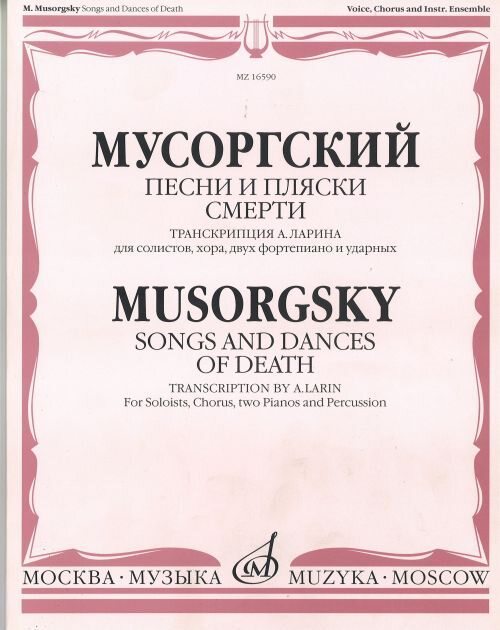Mussorgsky, Modest Petrovich: Songs and Dances of Death
Transcription by A. Larin. For Soloists, Chorus, two Pianos and Percussion
The scope of A Larin's work is large. He is author of orchestral and vocal-orchestral scores (Poem, Symphony, suite A Summer in Mitrofanovo Village', tableau 'The Birth of a City1, 'Praise to the Academy', etc), choral compositions (an oratorio, seven cantatas, choral concertos and cycles), compositions for Russian folk orchestra ('Till the Cocks Crow for the Third Time', 'Concerto-Bylina', etc) and for wind band ('Russian Fantasy*), chamber compositions, works for Children, music for movies, etc.
Aleksey Larin participates in the performances of his own music as pianist, organist, conductor, and member of a chorus. His works appear in the concert programs of such renowned performers as V. Fedoseev, K. Orbelian, A Vedernikov, V. Pon'kin, B. Ungrangsee, V. Minin, G. Dmitryak, V. Sudakov, N. Nekrasov, A Poletaev, V. Matorin, M. Shaposhnikova, and many others.
In 1989 Aleksey Larin turned to one of Modest Musorgsky's most important work, the vocal cycle Songs and Dances of Death. As he himself confessed, 'at first I did not dare to touch the legendary cycle. And this was not only because of its fame. Would the sound of chorus be appropriate there? Wouldn't the result be a trivial arrangement? Any good transcription - from Liszt's paraphrases to the Carmen Suite - provides a new quality, it is like a poetic rendering rather than a word-for-word translation. Only later I felt that the cycle
 Deutsch
Deutsch English
English Español
Español Français
Français Polski
Polski Română
Română Slovenský
Slovenský Slovenščina
Slovenščina 中文
中文